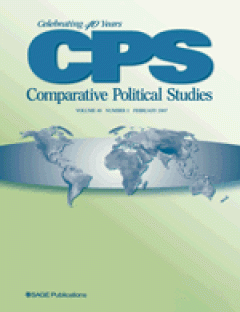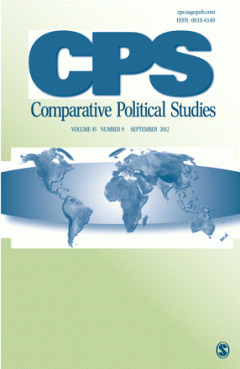Filter by

Informative Regress: Critical Antecedents in Comparative Politics
How can political scientists best uncover historical causation without committing infinite regress? This article introduces a revised framework for historical analysis that can help systematically capture the deepest causal factors in political development. It improves on the familiar “critical juncture” framework by specifying the precise causal or noncausal status of the “antecedent condition…
- Edition
- Vol. 43 no. 7, July 2010. pp. 886-917
- ISBN/ISSN
- 00104140
- Collation
- -
- Series Title
- Comparative Political Studies
- Call Number
- -

The Political Economy of Authoritarian Single-Party Dominance
Why do authoritarian dominant parties, once established, continue to win elections or lose power? Employing a time-series cross-national analysis of election outcomes and two country case studies, the author shows that dominant parties endure despite poor economic performance, voter demand for new parties, and sufficiently permissive electoral institutions. Instead, the author demonstrates that…
- Edition
- Vol. 43 no. 7, July 2010. pp. 807-834
- ISBN/ISSN
- 00104140
- Collation
- -
- Series Title
- Comparative Political Studies
- Call Number
- -

Institutional Feedback and Support for the Welfare State: The Case of Nationa…
Researchers interested in the political consequences of the welfare state argue that cross-country variations in the design of social policy institutions produce distinct patterns of public support for the welfare state. This research proposes an institutional feedback effect in which welfare institutions, once created, transform political debate, generate new constituencies, and alter how indi…
- Edition
- Vol. 43 no. 7, July 2010. pp. 862-885
- ISBN/ISSN
- 00104140
- Collation
- -
- Series Title
- Comparative Political Studies
- Call Number
- -

Beyond Dictatorship and Democracy: Rethinking National Minority Inclusion and…
Most standard models of democratization privilege class-based actors and the regimes they prefer to account for patterns of dictatorship and democracy. These models are ill suited, however, to explain political regime change in interwar Eastern Europe, where the dominant cleavage was not class but nationality. As a consequence, neither the process of regime change nor the resulting regime outco…
- Edition
- Vol. 43 no. 8-9, August 2010. pp. 1089-1118
- ISBN/ISSN
- 00104140
- Collation
- -
- Series Title
- Comparative Political Studies
- Call Number
- -

Diffusion and the Constitutionalization of Europe
This article begins with a rather forceful defense of the explanatory role of formal institutions—and, in particular, constitutions—in the study of democratization. Important aspects of constitutions play a significant part in shaping the quality, type, and survival of institutional arrangements in new democracies. With this assumption, the article turns seriously to theories of constitutional …
- Edition
- Vol. 43 no. 8-9, August 2010, pp. 969-999
- ISBN/ISSN
- 00104140
- Collation
- -
- Series Title
- Comparative Political Studies
- Call Number
- -

Reading History Forward: The Origins of Electoral Systems in European Democra…
This article reexamines the reconfiguration of electoral systems in European democracies in the first age of democratization. Rather than asking why some countries maintained the status quo whereas others “switched” to proportional representation (PR), the author argues that both single-member plurality (SMP) and PR were departures from the predemocratic electoral institutions in most of Europe…
- Edition
- Vol. 43 no. 8-9, August 2010, pp. 1059-1088
- ISBN/ISSN
- 00104140
- Collation
- -
- Series Title
- Comparative Political Studies
- Call Number
- -

The Founding of the French Third Republic
How France became a consolidated democracy after the Franco-Prussian War of 1870 has received little attention from students of comparative democratization. Contrary to earlier structural theories, the French case shows that in periods of high social uncertainty, political elites with clear ideological visions of the future have a strategic advantage over their more “pragmatic” opponents. Clear…
- Edition
- Vol. 43 no. 8-9, August 2010. pp. 1023-1058
- ISBN/ISSN
- 00104140
- Collation
- -
- Series Title
- Comparative Political Studies
- Call Number
- -

The Historical Turn in Democratization Studies: A New Research Agenda for Eur…
This article lays the theoretical and methodological foundations of a new historically minded approach to the comparative study of democratization, centered on the analysis of the creation, development, and interaction of democratic institutions. Historically, democracy did not emerge as a singular coherent whole but rather as a set of different institutions, which resulted from conflicts acros…
- Edition
- Vol. 43 no. 8-9, August 2010, pp. 931-968
- ISBN/ISSN
- 00104140
- Collation
- -
- Series Title
- Comparative Political Studies
- Call Number
- -

Interests, Inequality, and Illusion in the Choice for Fair Elections
Why do actors in transitional governments choose to hold fair elections when so many other options are available? The answer to this question is key to understanding an essential element of democracy’s institutional collage. This essay explores the choice of fair elections through the comparison of two episodes in Portuguese history: the elections held at the founding of the First Republic (whi…
- Edition
- Vol. 43 no. 8-9, August 2010, pp. 1119-1147
- ISBN/ISSN
- 00104140
- Collation
- -
- Series Title
- Comparative Political Studies
- Call Number
- -

The Diffusion of Regime Contention in European Democratization, 1830-1940
This article goes beyond the established literature’s focus on domestic conditions by examining the impact of external impulses on European democratization from 1830 to 1940. Specifically, it analyzes the diffusion of regime conflict that arose from the cross-national spread of situational judgments about the feasibility of political change: Striking precedents of regime collapse, such as the o…
- Edition
- Vol. 43 no. 8-9, August 2010, pp. 1148-1176
- ISBN/ISSN
- 00104140
- Collation
- -
- Series Title
- Comparative Political Studies
- Call Number
- -

The Great Reform Act of 1832 and British Democratization
This article focuses on the brief period (1828-1835) of intense political change in the years immediately before and after the Great Reform Act of 1832 as a critical juncture within the process of British democratization. This change was set in motion by a movement to extend the rights of religious minorities, but soon took on a dynamic of its own and led, quite unexpectedly, to a fundamental b…
- Edition
- Vol. 43 no. 8-9, August 2010. pp. 1000-1022
- ISBN/ISSN
- 00104140
- Collation
- -
- Series Title
- Comparative Political Studies
- Call Number
- -

Do Ethnic Parties Exclude Women?
Do parties that represent ethnic minorities tend to exclude women? There are several reasons to think that this may be the case. First, the comparatively smaller size of ethnic parties could exclude women, especially under proportional representation. Second, the subcultures of many ethnic minorities are often more patriarchal than the majority culture, and thus parties representing such groups…
- Edition
- Vol. 43 no. 10 October 2010.pp. 1179-1201
- ISBN/ISSN
- 00104140
- Collation
- -
- Series Title
- Comparative Political Studies
- Call Number
- -

Corruption and Trust: Theoretical Considerations and Evidence From Mexico
The growing empirical literature on political corruption shows trust (interpersonal and political) to be both cause and consequence of corruption: a conclusion that largely builds on studies using cross-national measures of corruption based on perceptions of corruption rather than actual experience, raising questions of endogeneity. The lack of trust fed by corruption is considered critical in …
- Edition
- Vol. 43 no. 10, October 2010.pp. 1258-1285
- ISBN/ISSN
- 00104140
- Collation
- -
- Series Title
- Comparative Political Studies
- Call Number
- -

What You Want Depends on What You Know: Firm Preferences in an Information Age
Information has become a core input for many companies. This article examines how this affects firm policy preferences. In contrast to national typologies of capitalism or microeconomic expectations, it uses information economics and historical institutionalism to construct a deductive model positing two basic logics. Firms with significant information assets view data as a private good, suppor…
- Edition
- Vol. 43 no. 10, October 2010.pp. 1286-1312
- ISBN/ISSN
- 00104140
- Collation
- -
- Series Title
- Comparative Political Studies
- Call Number
- -

Political Competition as an Obstacle to Judicial Independence: Evidence From …
A large literature attributes independent courts to intense political competition. Existing theories, however, have a previously unrecognized boundary condition— they apply only to consolidated democracies. This article proposes a strategic pressure theory of judicial (in)dependence in electoral democracies, which posits that intense political competition magnifies the benefits of subservient c…
- Edition
- Vol. 43 no. 10, October 2010. 1202-1229
- ISBN/ISSN
- 00104140
- Collation
- -
- Series Title
- Comparative Political Studies
- Call Number
- -

Why Get Technical? Corruption and the Politics of Public Service Reform in th…
The emergence of new information and communication technologies in the 1990s offered governments opportunities to deliver public services more effectively to their citizens. Yet national and subnational authorities have employed such technologies in highly uneven ways. Drawing on a new data set of technology policy adoption by Indian states, the author argues that political calculations drive v…
- Edition
- Vol. 43 no. 10 October 2010.pp. 1230-1257
- ISBN/ISSN
- 00104140
- Collation
- -
- Series Title
- Comparative Political Studies
- Call Number
- -

Islam and Large-Scale Political Violence: Is There a Connection?
Are Muslims especially prone to large-scale political violence? From Montesquieu to Samuel Huntington, prominent modern analysts of politics have regarded Muslims as unusually inclined to strife. Many other observers have portrayed Islam as a peace-loving faith and Muslims as largely pacific.Yet scholars still lack much hard evidence on whether a relationship between Islam and political violenc…
- Edition
- Vol. 43 no. 11, November 2010 .pp. 1327-1362
- ISBN/ISSN
- 00104140
- Collation
- -
- Series Title
- Comparative Political Studies
- Call Number
- -

Obstinate and Inefficient: Why Member States Do Not Comply With European Law
This article seeks to explain cross-country variation in noncompliance with European law. Although noncompliance has not significantly increased over time, some European Union member states violate European law more frequently than others.To account for the observed variance, the authors draw on three prominent approaches widely used in the compliance literature— enforcement, management, and le…
- Edition
- Vol. 43 no. 11, November 2010.pp. 1363-1390
- ISBN/ISSN
- 00104140
- Collation
- -
- Series Title
- Comparative Political Studies
- Call Number
- -

Staying Alive: Genetics in the Service of the Welfare “People’s Home”
This article aims to contribute to the ongoing debate over population politics and the perceived reinvigoration of eugenic practices in “people’s home” countries. The ability of governments to subsidize genetic technologies or familial lifestyle choices also gives them the ability to choose who has access to these technologies and in so doing the ability to favor the procreation of one group ov…
- Edition
- Vol. 43 no. 11, November 2010 .pp. 1391-1414
- ISBN/ISSN
- 00104140
- Collation
- -
- Series Title
- Comparative Political Studies
- Call Number
- -

Whos in Charge? Presidents, Assemblies, and the Political Control of Semipres…
This article develops an account of who controls Europe’s semipresidential cabinets politically. The authors ask which actors negotiate cabinet composition and what shapes who is in charge of the cabinet—questions that have been the focus of key debates about the political consequences of this regime type since Duverger. This article proposes and tests a principal—agent account of semipresident…
- Edition
- Vol. 43 no. 11, November 2010.pp. 1415-1441
- ISBN/ISSN
- 00104140
- Collation
- -
- Series Title
- Comparative Political Studies
- Call Number
- -
 Computer Science, Information & General Works
Computer Science, Information & General Works  Philosophy & Psychology
Philosophy & Psychology  Religion
Religion  Social Sciences
Social Sciences  Language
Language  Pure Science
Pure Science  Applied Sciences
Applied Sciences  Art & Recreation
Art & Recreation  Literature
Literature  History & Geography
History & Geography